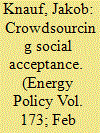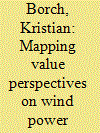|
|
|
Sort Order |
|
|
|
Items / Page
|
|
|
|
|
|
|
| Srl | Item |
| 1 |
ID:
191179


|
|
|
|
|
| Summary/Abstract |
Citizen co-investment in wind energy projects has recently received a lot of attention among scholars and policymakers as a way to finance renewable energy projects and increase community acceptance of these projects. Citizen co-investment refers to the process by which members of the local community can financially participate in renewable energy projects prior to or shortly after construction. While previous research has often been cross-sectional and focused on the preferences of citizen-investors, this paper focuses on the perspective of project developers and asks why, when and how they offer citizens the opportunity to co-invest in wind farms. The work is based on the analysis of fourteen in-depth interviews with a sample of experienced German wind energy developers. The analysis shows that the decision to offer co-investment is driven by citizen demand and local stakeholder preferences, rather than financial needs. We shed light on how experienced developers deal with key trade-offs in terms of the timing of their offering and the choice of capital structure. As a result, we offer a number of testable propositions for further research on the nuanced relationship between citizen co-investment and social acceptance and derive recommendations for policymakers.
|
|
|
|
|
|
|
|
|
|
|
|
|
|
|
|
| 2 |
ID:
162305


|
|
|
|
|
| Summary/Abstract |
Social acceptance of wind power is a complex matter, and national public interest does not necessarily translate into local public interest. If community concerns is disregarded in public spatial planning and the private development of wind power projects, the expected increase in the production of wind power energy will be jeopardized. Value propositions for installing wind farms in a community often consider only national policy targets, end users and those organizations that make a profit on installing, running or owning a wind turbine power plant. In many cases, the impact of technologies on society is underestimated, especially the impact on those actors who are influenced by technological change but without perceived benefit. This paper applies a value framework to systematically analyse the perceived value of the National Test Centre for Large Wind Turbines in Denmark, considering different stakeholder dimensions of acceptance (socio-political, market and community) from four perspectives (economic, psychological, sociological and environmental) before arriving at some policy recommendations on how to incorporate community values when siting wind turbines.
|
|
|
|
|
|
|
|
|
|
|
|
|
|
|
|
| 3 |
ID:
121288


|
|
|
|
|
| Publication |
2013.
|
| Summary/Abstract |
Understanding the context in which local wind farm development has been accepted by the local community is important for meeting the United States' wind energy goals. To further this understanding in the rural Midwest, we investigated three counties in Indiana with varying levels of wind farm development using a mail survey, stakeholder interviews and a review of local newspaper articles and government documents. We found high levels of acceptance for wind energy in general and for local wind farms in all three counties despite the differences in actual development. Multiple statistical methods were employed to identify factors leading to support of wind turbines within the community, but support was so high that no individual factors were identified as statistically significant. The survey and interviews showed that reasons for support of wind energy include economic benefits to the local community, environmental benefits and the protection of the agricultural lifestyle and landscape. Reasons for opposition include concerns about setback distances, impacts on rural lifestyles, and impacts on other types of development. Despite overall community support, the support of the local county governments varied and appears to have greatly impacted wind farm development within their jurisdictions.
|
|
|
|
|
|
|
|
|
|
|
|
|
|
|
|
| 4 |
ID:
171386


|
|
|
|
|
| Summary/Abstract |
Understanding the factors influencing community acceptance of renewable energy projects such as offshore wind farms is important for achieving a transition to low carbon energy sources. However, to date community acceptance research has concentrated on responses to actual proposals, seeking to explain local objections. ‘Upstream’ research that investigates the ‘place-technology fit’ of a potential renewable energy project before it is proposed is scarce, yet can inform technology deployment by taking local knowledge and preferences into account. We address this gap in a study conducted in Guernsey, Channel Islands. Data was collected using a survey (n = 468) co-designed with island policy makers presenting technical, economic and locational details of a potential offshore wind project. Results show that acceptance of the same project design differed significantly across alternative development locations. Regression analyses compared the roles of personal, context and project-related factors in explaining acceptance for each site. Support for using wind energy for local electricity supply was the most important predictor of acceptance, and this variable mediated the relationship between island energy security and community acceptance. We conclude that place matters for community acceptance and that security and autonomy are co-benefits of local renewable energy projects that deserve further research.
|
|
|
|
|
|
|
|
|
|
|
|
|
|
|
|
|
|
|
|
|